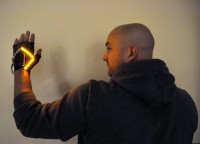Two years ago, Jack O’Neal came back from his deployment in the Middle East and enrolled as a mechanical engineering student at Portland State. Last spring, his engineering 199 class was given an assignment to create something that “you think you could fix for the world.” When someone in the class spoke up and said they would like to see a better lighting system designed to assist cyclists, O’Neal’s brainchild, YouTurn, was born.
YouTurn in the bike lane
Two years ago, Jack O’Neal came back from his deployment in the Middle East and enrolled as a mechanical engineering student at Portland State. Last spring, his engineering 199 class was given an assignment to create something that “you think you could fix for the world.” When someone in the class spoke up and said they would like to see a better lighting system designed to assist cyclists, O’Neal’s brainchild, YouTurn, was born.

“I don’t really like the name—it sounds kind of cheesy—but it was the best I could come up with, and it stuck,” O’Neal said.
YouTurn is a fingerless glove designed to function as a turn signal when bikers put their left arm out to signal to traffic. A device called the accelerometer chip is activated by the cyclist’s hand movement and generates power to the small light arrows on the glove. When the cyclist’s arm is stuck straight out in the traditional left-turn hand signal, the left-turn arrow lights up; when their arm is bent in the traditional right-turn hand signal, the right-turn arrow lights up.
“I was driving home behind a biker after class, and he put his arm out for a left signal, and a light bulb went off in my head,” O’Neal said.
When O’Neal arrived home that night, he began to tinker with the accelerometer chip, which can track a moving object in three dimensions. After a series of prototypes, the YouTurn developed into its current form.
O’Neal’s decision to enroll at PSU was prompted by the recession and the lack of jobs in 2009. He is hoping that his degree in mechanical engineering can catapult him into the field of product design—a passion of his. He and his wife are both full-time students and parents to their young daughter, who is a huge fan of the YouTurn glove.
Right now O’Neal is focused on finishing school, but he is also trying to acquire funding for the glove so it can be transformed into a real product that can be manufactured and sold. Several businesses have approached him, but he hasn’t settled on an offer yet.
Several customers have contacted O’Neal as well, asking where they can buy his product. For now, he builds the YouTurn at cost for people who want it and ships it directly to them. His advertising has been limited to social networking sites like Twitter and Kickstarter, which markets and “crowdfunds” for new ideas and technologies.
“It’s not really about the money. I want to see it come to life and become a real, finished product,” O’Neal said.





